After abruptly switching to a virtual rendition in 2020, the San Diego Museum of Art's annual floral event, Art Alive, returned in-person in 2021. Despite the relatively scaled-back version of its previous 40+ year history, some 10,000 visitors attended throughout the weekend.
Integral to Art Alive are the dozens of floral interpretations of artworks by local designers, scattered throughout the museum's gallery near the works that inspired them — whether they are abstract interpretations or amazingly accurate renditions of the work itself.
The centerpiece of SDMA's decor during Art Alive is the rotunda, the lobby's dramatic, balconied atrium, often by an internationally renowned floral designer. This year, local artist and botanical designer Britton Neubacher will adorn the rotunda with her moss sculptures and science-meets-nature designs.
'The way to make a world is to bring in nature'
Before leaving her career to focus on botanical design, she worked in social work in a crisis center, and would bring plants into the workspace to help create little sanctuaries for the clientele.
"I just was observing firsthand how simple it really was, the power of nature on our wellbeing," Neubacher said. "I also was experiencing a lot of burnout. And I would go home and get my hands in the potting soil. At one point, somebody gave me a piece of blown glass that hung. And because I was obsessed with doll houses as a kid, I saw that and just knew there had to be a little mini world in there — and the way to make a world is to bring in nature, right?"
From there, Neubacher launched Tend Living, her botanical design firm, in 2007, and also dipped her toes in the arts community.
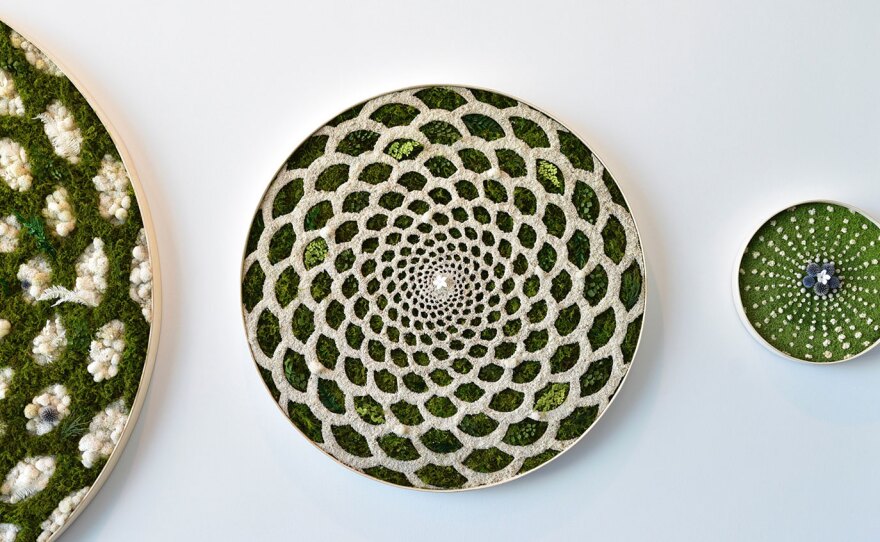
In recent years, Neubacher was part of the 2019 group exhibition "Forces of Nature," featuring eighteen regional landscape-inspired installations at the San Diego International Airport.
Last summer, Neubacher opened "In the Middle Between This and That: Guardians of the Fertile Void," a solo exhibition of sculptures and flat works at Trash Lamb Gallery, where the South Park gallery's DIY ethos and accessibility was appealing to her.
Moss 'doesn't play by the rules'
Neubacher primarily uses moss as her material, along with other preserved foliage to embellish. Her interest in moss and preserved greenery is a departure from the single-use nature of cut flowers, driven primarily by sustainability.
"I love working with moss. It's messy and it's untamed and it's unpredictable and it doesn't play by the rules and it won't stay inside the lines. And it's really chaotic in nature. My attempt is to bring some organization to its chaos to illustrate that this time that we're in, that may feel like out of control and maybe even like a breakdown actually has an intelligence behind it if we can trust nature's process," Neubacher said.
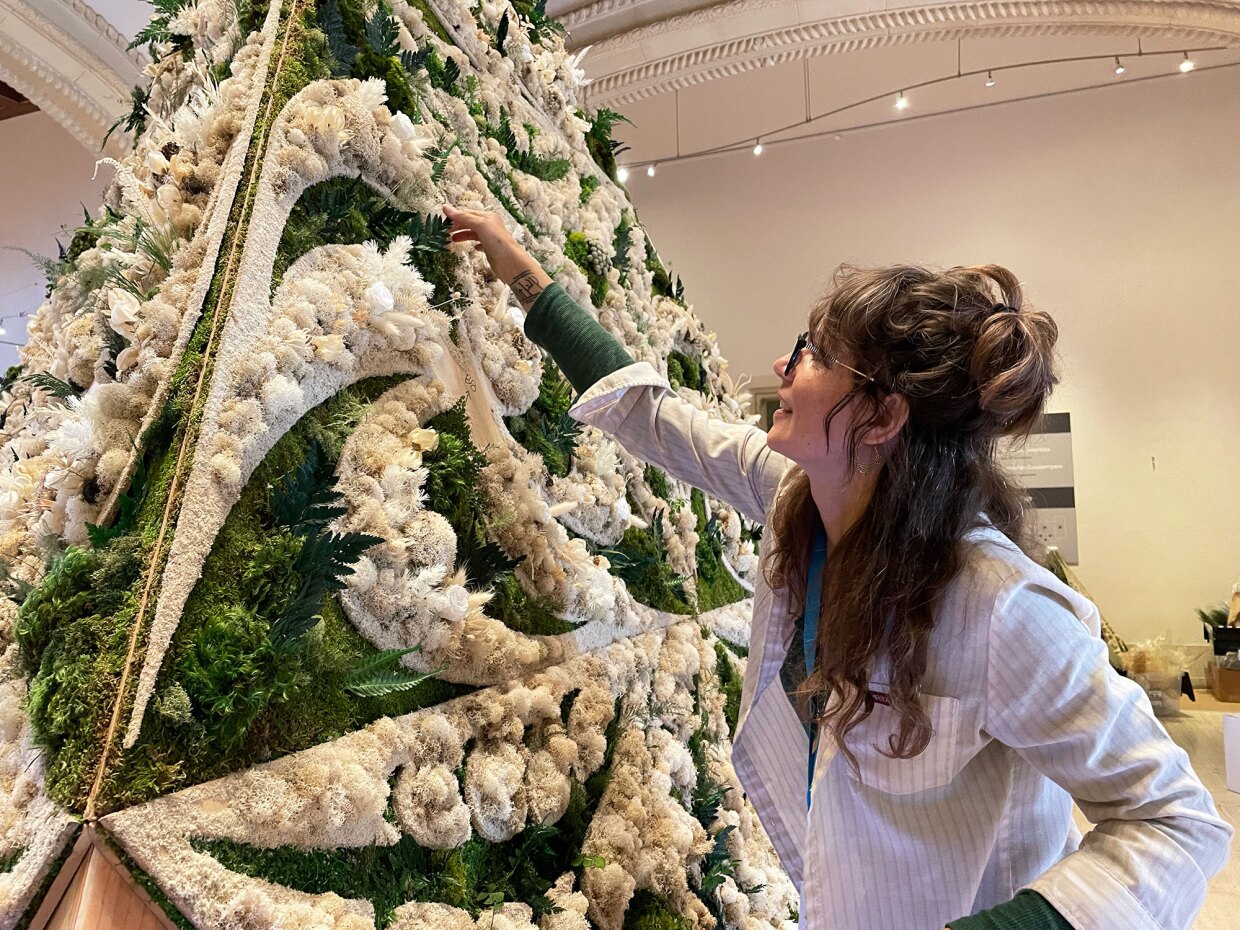
She uses a variety of preserved mosses, some bleached to a gentle cream color, and others even granulated into a finer powder-like form that she can use for more detailed applications.
"It's a painstaking process that we've created that basically is like painting with moss. And we create granulated, very refined powders of moss that allow us to get highly detailed. And then we also create space for the more wild expression of that material. So we combine the two," Neubacher said.
Her botanical designs are sculptural and wild looking, but also exude an element of geometry or precision. Neubacher's "portals," "plantities" and other moss-based installation works draw on that balance of chaos and organization that ultimately inspired her Art Alive rotunda design, "Organized Chaos."
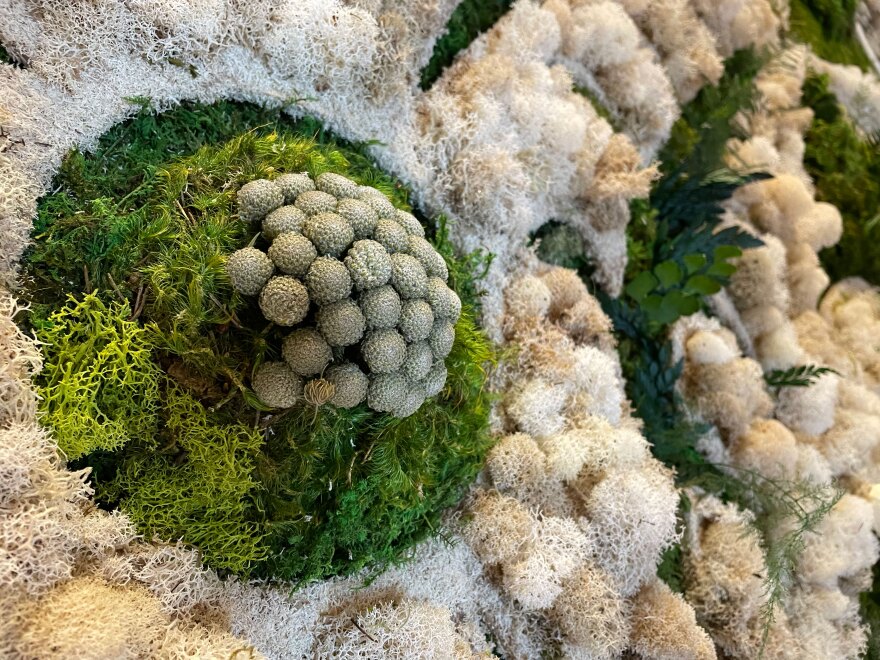
Op art meets untamed nature
While Neubacher's inspiration comes from the patterns and designs in nature, the work in the rotunda is also inspired by the optical illusion-based "op art" movement pioneered by Hungarian-French artist Victor Vasarely, who rose to prominence in the 1930s.
"[Vasarely's] optical illusion art tricks the eye, and he does that through use of color and pattern. But what I'm trying to do is play with the largely untameable nature of moss, and I hope to illustrate the possibility that this chaotic time we are living in right now is in illusion, too. Perhaps that there is order in the chaos as we get composted and reorganized into something stronger and hopefully more sustainable," Neubacher said.
In the museum's rotunda, Neubacher installed a massive, 13 ft-tall pyramid consisting of 27 large, triangular panels. Each panel is approximately 5 ft in size and covered with alternating designs: intricate pinwheel or vine-like patterns of moss, preserved plants like ferns and pods, tree foliage, preserved roses (chosen for their healing nature) and more.
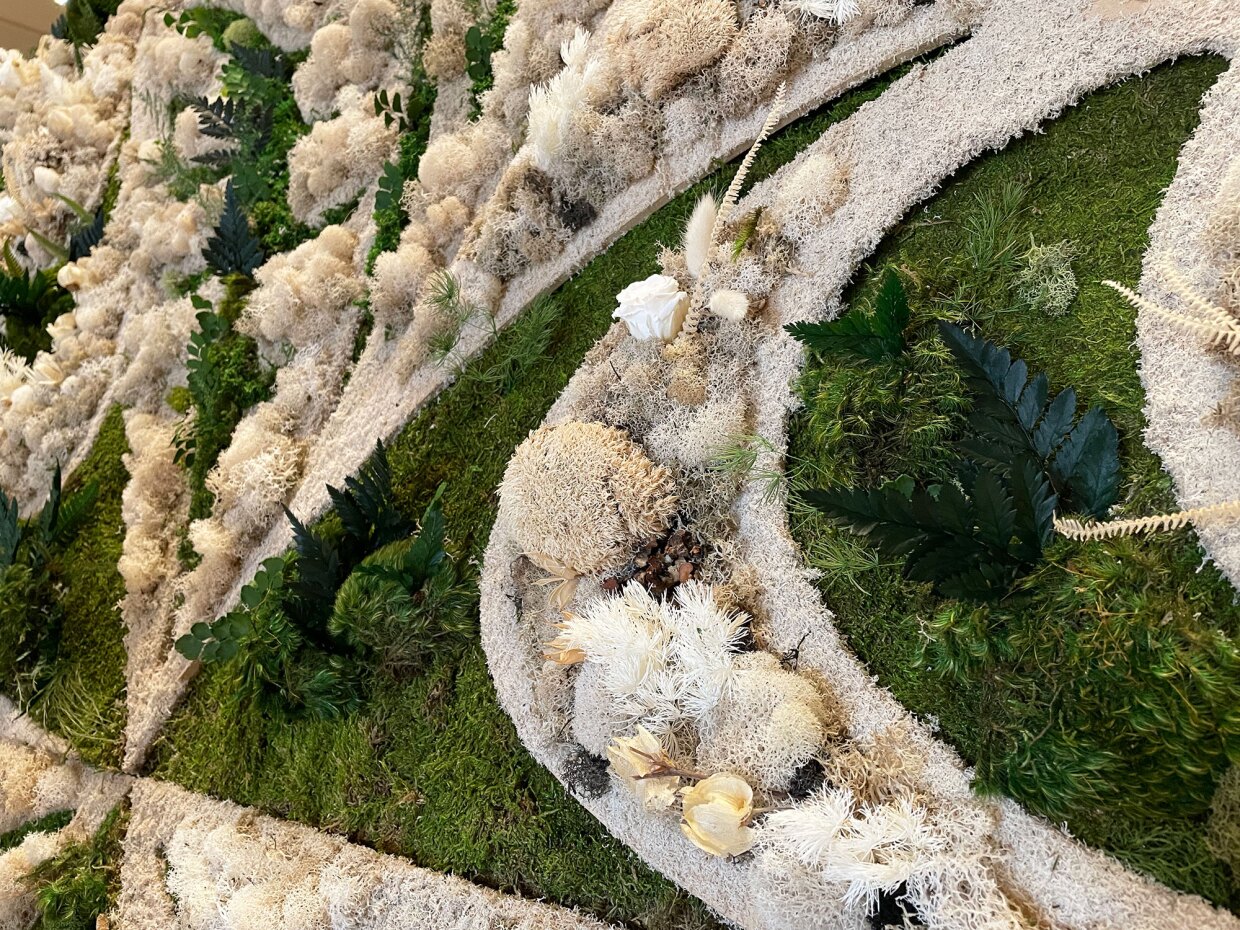
In the patterns, there are hints of psychedelia, fractal and sacred geometry and the sorts of patterns and formulas found in nature like the golden rule and the Fibonacci sequence. It feels mathematical, but still wild — in the sense that the calculations are something beyond human control. Plus, there's wonder in how Neubacher managed to get moss to do all of that.
The colors are also from nature: countless shades of greens and creams. Scant splashes of color — like blue-tinged LED lights affixed to the bottom of the pyramid — are a nod to Vasarely.
Be sure to look up: suspended from the museum's ceiling above the pyramid are three large moss-covered spheres, slowly spinning on motors — it's almost otherworldly or celestial. And also realistically cool: giant disco-moss balls.
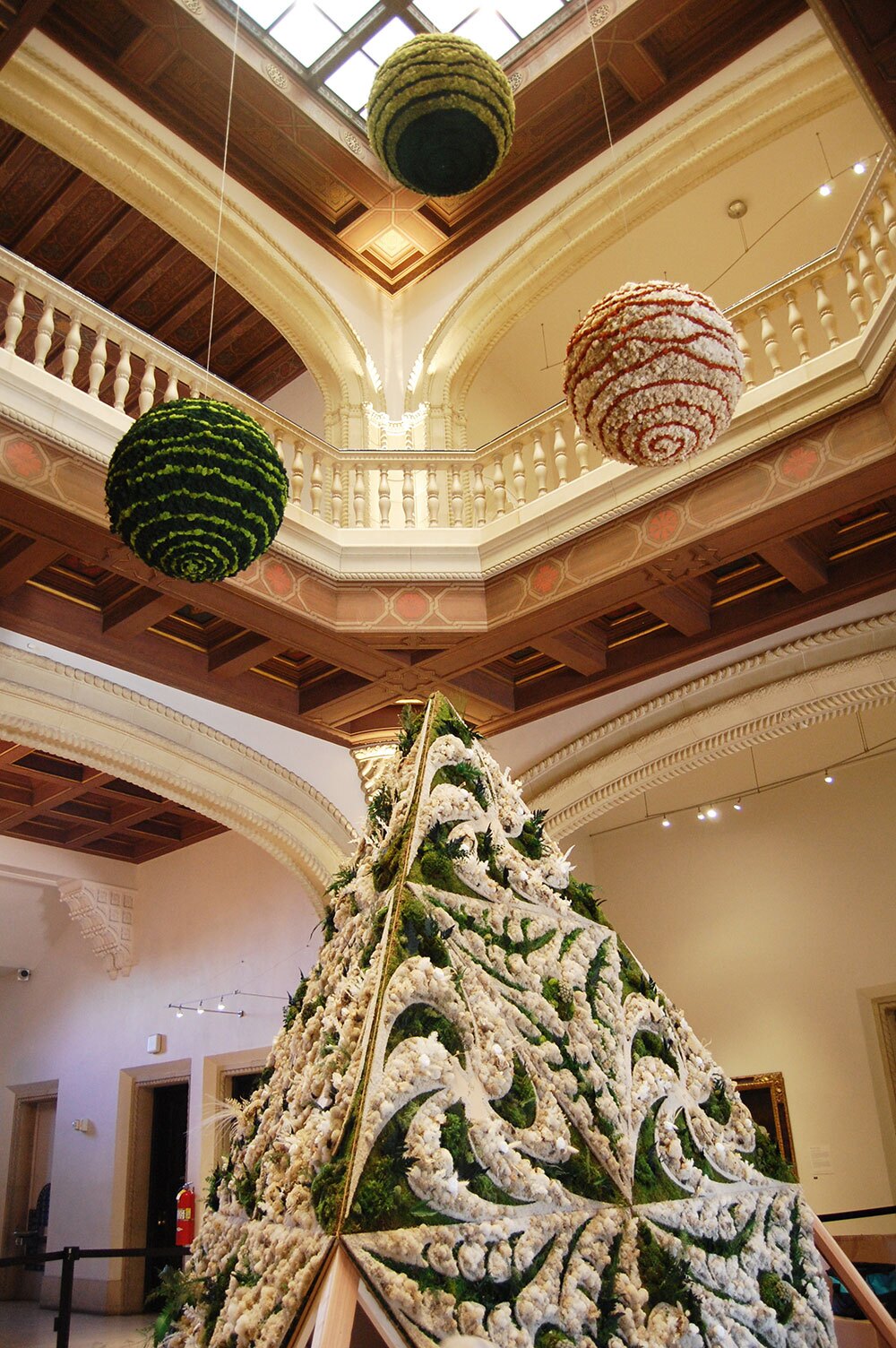
A large, charred tree-branch ikebana sculpture is also part of the installation, designed in collaboration with Neubacher by ikebana artist Noriko Mochida. Ikebana is a traditional Japanese form of floral arrangement, often highly minimalist.
Vines and cascading moss pieces hang from the second floor balcony's balustrades. Neubacher worked with a team of 20 people to construct and install the rotunda design, including volunteers and staff.
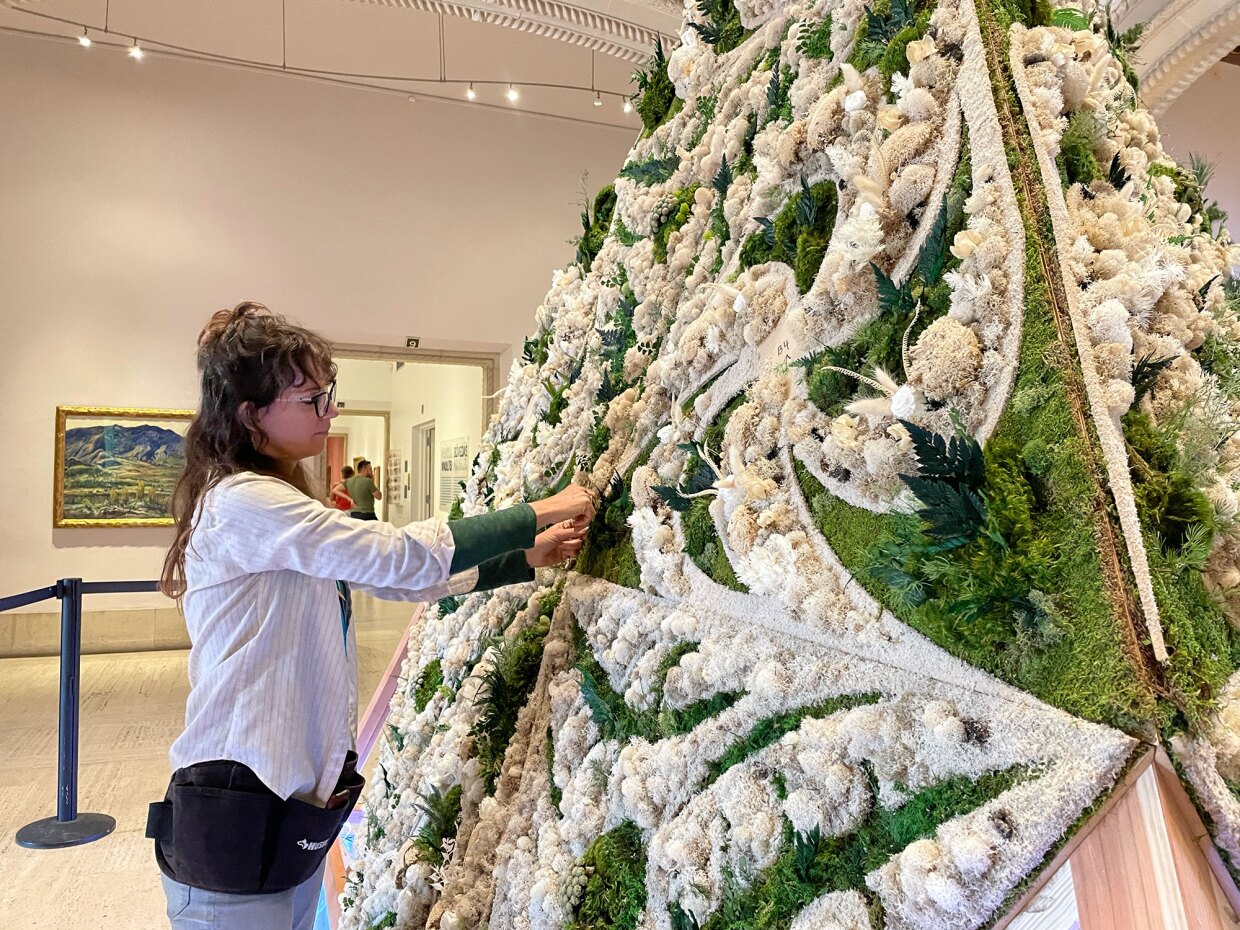
Unlike previous years with cut flowers, the design will survive indefinitely. While Neubacher doesn't yet know what is next for the pyramid when Art Alive is over, she appreciates the immersive moment of the event.
"Having a public art opportunity like at SDMA feels really cool — that people can come and just be with the work, and it's not about acquiring or doing a job for somebody and hoping they like it. It's like this is a very special way to sort of give back to my community, to the arts community, to San Diego as a whole," Neubacher said.
Details:
SDMA's Art Alive is Friday Apr. 29 through Sunday, May 1, 2022
Event schedule
Tickets
Art Alive: $40 (free for members)
Bloom Bash: $250 members, $300 public
Note: Art Alive tickets or museum membership required to access the museum all weekend
Also on view:
- The new Fernando Casasempere exhibition, "Terra," opens Friday and will be on view during Art Alive, through Sept. 5, 2022.
- For Friday night's return of the ticketed Bloom Bash party, artist Ian Brill will install immersive work using colorful light panels. This work will also be on view throughout the weekend.






